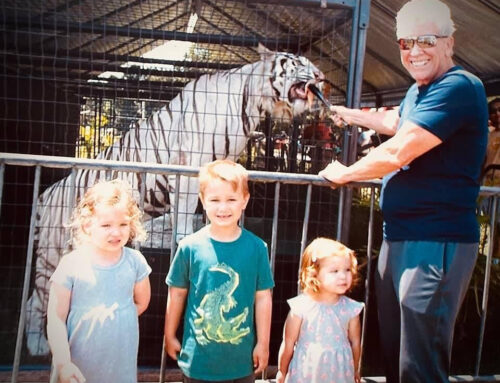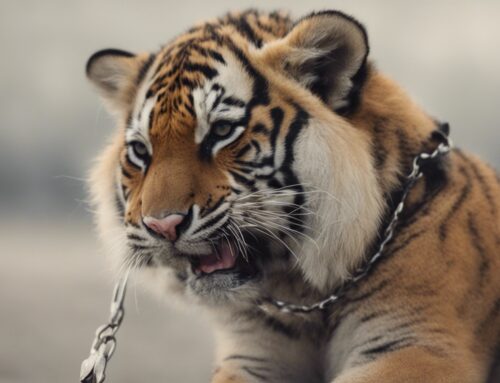Tiger Cubs Exploited In America’s Malls Of Shame (VIDEO)
Alisa Manzelli, Global Animal
Animal advocates are seeking to end a sickening year-round attraction in malls across America: the exploitation of tiger cubs. One notorious exotic animal exhibit travels to malls all over the country, charging shoppers to pet and take a photo with a tiger cub.
The wild animals in the show are provided by Joe Schreibvogel, owner of G.W. Exotic Animal Memorial Park, a private roadside zoo in Oklahoma with a questionable past. Schreibvogel claims to provide consumers with education about the plight of exotic cats. In reality, 23 tiger cubs died within a year while on Schreibvogel’s retail circuit.
At the Northgate Mall in Cincinnati, Ohio, shoppers paid $55 to get their pictures taken with a cub and play with the baby tigers in a pen, according to an Inside Edition investigation. Many of these tigers were either noticeably ill, suffering from diarrhea or missing patches of fur, and all appeared distressed. Where do these tiger cubs come from and why are they in cages by the food court?
Schreibvogel operates the traveling tiger exhibit under the name Big Cat Rescue Entertainment—not to be confused with the legitimate nonprofit Big Cat Rescue, the largest sanctuary in the U.S. for abused and abandoned big cats.
Schreibvogel operates as a nonprofit and the park’s website is setup to take donations. Schreibvogel’s G.W. Exotic Animal Memorial Park and Big Cat Rescue Entertainment have had several problems in the past. Though he denies any wrongdoing, he has paid $25,000 for repeated animal welfare violations and has been investigated by the USDA for the unexplained deaths of 23 tiger cubs at his park in 2010. He claims the deaths were a reaction to “bad formula,” though other organizations have had no such problems.
After receiving disturbing information involving animal cruelty and neglect at Schreibvogel’s “sanctuary,” PETA sent an undercover investigator to the park. What PETA discovered is disturbing: dead, dying, and injured animals, extremely crowded conditions, a serious lack of basic necessities, as well as untrained staff members who were intentionally cruel to many of the animals.
PETA’s website provides a graphic videodocumenting their findings. Schreibvogel maintains the video is a fabrication and has devoted a web page claiming he’s an innocent victim of “spies.” It’s a curious assertion given that legitimate sanctuaries do not breed, buy, sell, or trade animals.
PETA writes, “…a pseudo-sanctuary, such as G.W. Exotic Animal Memorial Park, breeds animals to keep itself supplied with cute babies to draw visitors to the park, profits by using them for public photo opportunities, and buys, sells, and trades animals.”
PETA continues, “Not only is Joe clearly using his park’s animals for profit in his traveling mall shows, but he also has an orchestrated breeding program that has produced dozens and dozens of animals shipped to facilities around the world.”
Despite a recent ban on pet sales in over 70 malls across the United States, many malls still promote animal cruelty. Mounds Mall in Anderson, Indiana, insisted on displaying these distressed tiger cubs, even after receiving a letter from PETA requesting the shopping mall cancel Big Cat Rescue Entertainment’s appearances. At Concord Mall in Elkhart, Indiana, the travelling tiger show made its fourth appearance this year. In fact, Bob Thatcher, the mall’s general manger, asserts the animals are “really well cared for,” and, “handled professionally.”
This video taken at a shopping mall shows differently:
Big Cat Rescue Entertainment claims to no longer feature these cubs in cages due to pressure from animal activists. Hooray! Needless to say, Global Animal believes no animals should be exploited for entertainment or profit. When shopping in America, you should not encounter a living tiger.
For now, Schreibvogel’s travelling show of caged wild animals, and what some call a scam-on-wheels, is on hiatus. Yet, the G.W. Wild Animal Park is still selling tickets, breeding, and exploiting the tigers as well as many other wild animals including lions, cougars, bears, primates, and wolves. These cruel exhibits can only stay in business if people pay to visit them.
Global Animal is calling for a boycott of Schreibvogel’s G.W. Exotic Animal Memorial Park and Big Cat Rescue Entertainment and regulation to end private ownership of wild animals. As we saw recently in Ohio, where a private zoo owner killed himself after releasing all of his captive animals who were subsequently shot to death, wild animals aren’t meant to be privately owned.
Let’s keep watch on shopping malls for exotic animal shows. With only 3,200 tigers left in the wild, there are more tigers in captivity in the United States than there are where they belong. We can change this.
Watch the Inside Edition story here:
http://www.globalanimal.org/2011/12/23/tiger-cubs-exploited-in-americas-malls-of-shame-video/61054/





Leave A Comment
You must be logged in to post a comment.